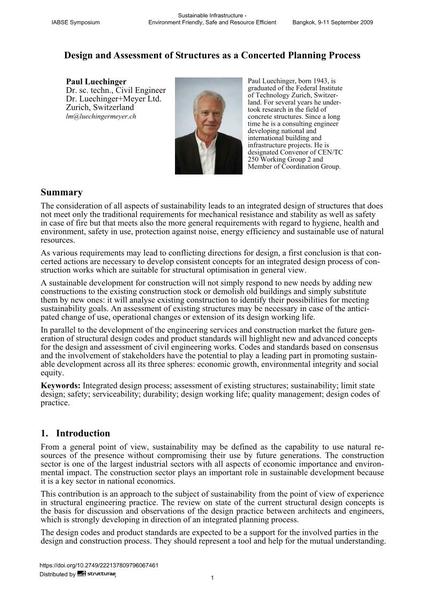Design and Assessment of Structures as a Concerted Planning Process

|
|
|||||||||||
Détails bibliographiques
| Auteur(s): |
Paul Luechinger
|
||||
|---|---|---|---|---|---|
| Médium: | papier de conférence | ||||
| Langue(s): | anglais | ||||
| Conférence: | IABSE Symposium: Sustainable Infrastructure - Environment Friendly, Safe and Resource Efficient, Bangkok, Thailand, 9-11 September 2009 | ||||
| Publié dans: | IABSE Symposium Bangkok 2009 | ||||
|
|||||
| Page(s): | 29-41 | ||||
| Nombre total de pages (du PDF): | 9 | ||||
| Année: | 2009 | ||||
| DOI: | 10.2749/222137809796067461 | ||||
| Abstrait: |
The consideration of all aspects of sustainability leads to an integrated design of structures that does not meet only the traditional requirements for mechanical resistance and stability as well as safety in case of fire but that meets also the more general requirements with regard to hygiene, health and environment, safety in use, protection against noise, energy efficiency and sustainable use of natural resources. As various requirements may lead to conflicting directions for design, a first conclusion is that con- certed actions are necessary to develop consistent concepts for an integrated design process of con- struction works which are suitable for structural optimisation in general view. A sustainable development for construction will not simply respond to new needs by adding new constructions to the existing construction stock or demolish old buildings and simply substitute them by new ones: it will analyse existing construction to identify their possibilities for meeting sustainability goals. An assessment of existing structures may be necessary in case of the antici- pated change of use, operational changes or extension of its design working life. In parallel to the development of the engineering services and construction market the future gen- eration of structural design codes and product standards will highlight new and advanced concepts for the design and assessment of civil engineering works. Codes and standards based on consensus and the involvement of stakeholders have the potential to play a leading part in promoting sustain- able development across all its three spheres: economic growth, environmental integrity and social equity. |
||||
| Mots-clé: |
durabilité
|
||||
